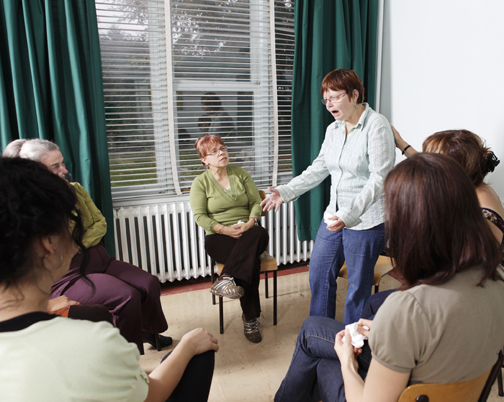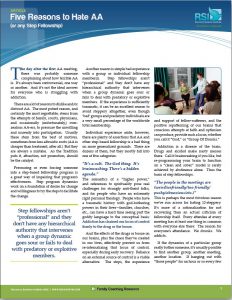Most of us have heard them. There are lots. This article discusses five of the most common reasons given for negativity about AA and other step fellowships, as well as the most potent reason many people have nothing good to say about step-based fellowship programs.
It’s a cult – with a hidden agenda”
“Those people in the meetings”
“No one should be told they’re ‘powerless'”
“You’re just replacing one crutch with another”
“It doesn’t work. Only a 3% success rate.”
What’s really behind the negativity? We know that some addicts and alcoholics are so anxious about anything that might possibly deprive them of their booze/pills/whatever, that it’s easier to trash-talk the fellowships than think about quitting. But that’s not the only thing behind the negativity.
What do you say when you hear someone give these reasons for hating AA? Particularly if it’s someone in recovery, or someone who loves a person who could benefit from recovery support? Download the article (below) to see if what you say is anything like what our guest author says about hating AA.
And the most potent reason that drives people away from step fellowships is often the result of the best possible intentions. Download the .pdf by clicking the image:















The problem with this post and certainly the arguments that might be made by believers of “the five reasons to hate AA,” is that there is clearly little undertaking of the distilled essence of the 12 steps. There is a reason that 12 step meetings exist in every country on Earth and that untold, immeasurable millions have benefited from the spiritual/energetic/emotional evolution principles that fuel the 12 steps. There is no other psychological system comes anywhere near that influence or positive effect. A worldwide network of searching, seeking individuals with the common agenda of healing and emotional evolution is the phenomenon of our time.
The “3% success rate” claimed here is utter nonsense. There is no way the benefit of the essential principles of the 12 steps can be measured. These principles are now woven into most psychotherapeutic systems and into the culture itself. In essence, all highly evolved people effectively practice these principles, no matter how they are framed. Pretty cool for a system scribbled out by two drinking buddies whose lives had gone awry in Akron, Ohio in 1938.
I too am generally interested, and currently preparing a blog article that centers around this topic. Every time I go to AA I get something out if it, so have absolutely no negativity regarding it, but I do feel it is an old-fashioned approach. Statistically, it doesn’t work. Further, there’s other things I’d rather do to recover, which also happen to be things I enjoy doing. I don’t enjoy going to AA meetings. I find them beneficial, but I don’t enjoy them, and I think most young addicts would agree. In a perfect world, we sprinkle in AA with our own recovery vision. We all have the power to create the perfect recovery program, one that’s well-rounded and has depth, instead of just hitting a meeting and calling it recovery. One thing I’m sure of: AA should definitely not be your only recovery tool. I’m on your website a lot and appreciate your content. Thanks for sharing, Tate
Every person is unique and to each is own. I found the program to work on a temporary basis and not for lifetime. Find a hobby and passion and connect with that and I found leaving after the the rooms success. there is life after meetings and I am a former addict living, thriving and loving life healthy and free from the bondage of addiction that held me back for many years.
Most people I know are using these reasons to justify continuing drinking, but personally AA is not for me, I find groups cause me anxiety. I use other methods of therapy. There is a lot of online support I use which benefit me greatly. Each to his own, AA works for so many.
I am not able to access this article – sidebar where? I have subscribed to the site.
You need to register here : https://www.recoverysi-sept.dev.cc/register/ in order to download materials. When you “subscribe” you receive email notifications of new content. Sorry for the confusion!